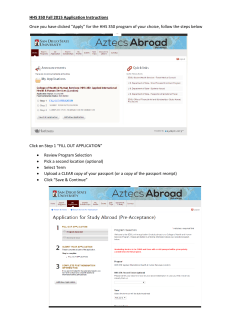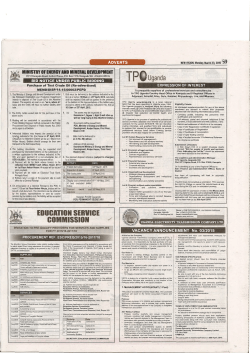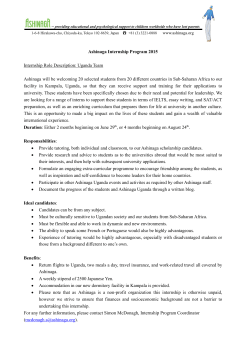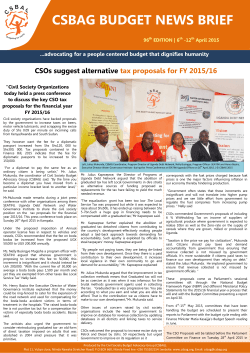
1 CSOs POSITION PAPER ON TAX REVENUE MEASURES FOR FY
CSOs POSITION PAPER ON TAX REVENUE MEASURES FOR FY 2015/16 Presented before Parliament of Uganda April 2015 1 1.0 INTRODUCTION The Minister responsible for Finance is mandated by the Public Finance Management Act 2015 section 13(11) (a) to present to Parliament the annual budget together with the Appropriation Bill and any other bills necessary to implement the budget for approval. Consequently, Hon Matia Kasaija the Minister of Finance Planning and Economic Development has presented to Parliament tax revenue measures for FY 2015/16 contained in the Finance Bill 2015, Excise Duty (Amendment) Bill 2015, Value Added Tax (Amendment) Bill 2015,The Income Tax (Amendment) Bill 2015 and Business Licenses Bill 2015. The new tax policy measures presented for the next FY2015/16 are targeted to yield UGX18.3 trillion in FY 2015\16. Uganda Revenue Authority is expected to collect UGX 11.613 trillion (gross) about 82% of the national budget through the following measures i) UGX 6.63 trillion (inclusive of NTRs) is expected from Domestic Taxes (56%) ii)UGX 271 bn is expected from Non Tax Revenues (NTRs) and iii)UGX 5.2 trillion (44%) from International Trade Taxes. The remaining 18% of the national budget will be expected from external sources. We the civil society organisations (Civil Society Budget Advocacy Group (CSBAG), SEATINI1 Uganda, ActionAid Uganda (AAIU), Uganda Debt Network (UDN), Development Initiatives (DI) and Water Governance Institute (WGI)) appreciate the importance of tax in financing development and Government’s desire to expand the tax base and develop initiatives to bolster tax administration efficiency. Having come together through a series of engagements to review government tax and non tax proposals over the years, we have reviewed the FY 2015/16 tax measures and have made observations, recommendations and proposals that government could explore to enhance revenue performance. 2.0 TAX REVENUE MEASURES for FY 2015/16 We have reviewed the following tax measures from the following Bills: 2.1 Excise Duty Amendment Bill 2015 (Schedule 2 to Act No.11 of 2014) 1 Southern and Eastern African Information and Negotiations Institute 2 Increase excise duty on Petrol from Shs.950 to Shs.1,000 and Increase excise duty rate on diesel from Shs.630 to Shs.680 per litre Observation We have noted that Government states that these increaments are small and will not translate into higher pump prices. The suppliers, however, have a tendency of increasing pump prices regardless of how much the increment is, given Government’s unwillingness to regulate the sector. Recommendation Government should regulate fuel companies to prevent haphazard increase in fuel pump prices because ultimately it increases the cost of doing business, making our products uncompetitive and worsens the poverty situation of the majority citizens. 2.2 Remove excise duty of USD 0.09 per minute on all incoming calls from Northern Corridor Member States (Kenya, Rwanda and South Sudan) In line with the directive from the EAC Heads of State under the Infrastructure Summit in a bid to reduce the cost of telecommunication and doing business in the EAC Other Member states have also removed the tax. Observations We commend government for removing the excise duty on incoming calls as this will reduce the cost of communication and contribute to easing the cost of doing business in the EAC. Recommendations We urge the EAC member states to put stringent measures/strategies to ensure that telecom companies follow suit and reduce the cost of telecommunication within the EAC. We also recommend Government to put in place effective monitoring mechanisms to ensure that this provision is not abused by telecom companies for illegal practices e.g money laundering, falsification and mis pricing. 3.0 THE FINANCE BILL 2015 3 3.1 Operator License fees for Vehicles We commend Government towards the proposed fees, in the wider spectrum of streamlining the revenue collection in the transport sector. We urge government to enforce the measure. 3.2 Passport Fees -Diplomatic / Official proposed at - 150,000 ushs -Ordinary- 150,000 ushs Observation We observe that an adult Ugandan has a right to apply for and to hold a passport. For an ordinary passport, the proposed charge is prohibitive. For the diplomatic passport, the proposed charge undermines the diplomatic stature. We further observe that whereas the time for obtaining an express passport has been stipulated, the rest of the categories have not been accorded the same. We again observe that there are no express remedies available to citizens in the event of failure to honour the stated timelines for issuance of the passport. Recommendation We, therefore, recommend that the charge for an Ordinary passport be maintained at its current rate of UGX 120,000 and the charge for Diplomatic/Official passport be increased to 300,000ushs to reflect the Diplomatic stature. We propose that Government clearly provides for appropriate remedies upon failure to honor the terms for issuance of a passport. We also call upon Government to address issues of wider corruption in the passport office, issues of working through third parties and unclear procedures at Passport office. 3.3 Motor Vehicles (excluding good vehicles which are between 5-10years old Motor Vehicles (excluding good vehicles which are 10yrs old or more. Observation 4 We observe that the initial intention of the environmental levy has not prohibited the importation of old vehicles. As such, the increase in the environmental tax will not prohibit the importation of old cars at the expense of the environment. We also not that the environmental fund has never been set up thus there is no effort to clean the environment from this tax. We commend government on the initiative to protect the environment through imposing this tax Recommendation We recommend that there should be a ban on all vehicles beyond ten year categorically including commercial and heavy duty trucks. The other areas like the manufacturing sector should be charged an environmental tax to better save the environment. We recommend that instead of putting penalities on importing old vehicles, there their should be tax incentives for importing new vehicles These taxes should also be extended to all other equipment and materials. We propose that government commits such revenue to an Environmental Fund as provided in the National Environmental Management Policy. 3.4 Provide for Non-refundable pre-payment on application for work permits (USD 500) We commend government for this permit fee. We however, recommend that this fee be increased to USD 1000 in order to discourage dumping cheap labor in Uganda. This will also free up employment opportunities for Ugandans. 3.5 Single Entry Visa Fees increased from 50-80USD We commend government for this increament, however we propose for that it is increased to 100 USD considering Uganda’s tourism potential and investment opportunities. 3.6 Impose Annual operator license fees in respect of vehicles and vessels Observation We commend Government for the increment of the threshold of operational licenses for boda bodas from 30,000 to 50,000. However, we believe that this increment is insignificant to guarantee quality boda boda services. Recommendation We, therefore, propose that the charge be in increased from 30,000 to 200,000ushs. This will help to decongest the cities, improve boda boda service and reduce on health burden borne by the citizens as result of boda boda accidents. 5 4.0 VALUE ADDED TAX (AMENDMENT) BILL 2015 4.1 Clause 3 (a) Increase annual registration threshold to 150m Observation We do welcome the effort. We believe this is going to increase the tax base, compliance and reduce costs of enforcement. We also observe that the 150m threshold has implications; i) it will reduce the size of the VAT register and improve compliance and ii) it will reduce the cost of administration of companies below the threshold of 150m iii) The 150 threshold will also entice companies that do not qualify to overstate their turnovers in a bid to enjoy the benefits of being VAT registered. Recommendation URA should be more vigilant in scrutinizing companies that apply for VAT registration to weed out under declaration of VAT. We recommend to URA to conduct stakeholder awareness on the proposed VAT amendments and other related changes. 4.2 Clause 3 (b) The annual registration threshold is one hundred and fifty million shillings Observation We welcome the effort to register commercial farmers. Recommendation There is need for a clear definition of a ‘commercial farmer’ in the interpretation clause for avoidance of doubt. 4.3 Clause 5 and Clause 6; Ammendment of section 24 and 25 of the Principal Act Observation 6 We have observed that this proposal is risky and likely to be misused by the mining companies, and sets a precedent for other sectors to demand for similar preferential treatment. It is also a veiled exemption that can lead to revenue loss worsened by high administrative costs to monitor this facility. Recommendation We recommend that the VAT principles should not be applied selectively. It is imperative that government does not encourage higher administrative costs in managing the proposed facility. 5.0 THE BUSINESS LICENCES (MISCELLANEOUS REPEALS) BILL, 2015 The purpose of this Act is to repeal redundant business licenses and to rationalize and simplify business licensing, practices and procedures in order to eliminate multiplicity and overlap of business licences. The Bill seeks to repeal section 9 of the Rivers Act, Cap.357 ,to repeal section 22 (2) of the Companies Act, 2012 to repeal sections 3and 4 of the Hides and Skins (Export Duty) Act, Cap.339 .Further, the Bill seeks to repeal the Liquor Act, Cap.93 and the Industrial Licensing Act, Cap.97; to amend section 12 of the Produce Protection Act, Cap.32; to repeal section 11(2) and (3) of the Fish Act, Cap.197 to abolish the angling license; to repeal sections 10(6), (7) and (8), 23, 31 and 32 of the Investment Code Act, Cap 92 in order to abolish the certificate of remittance, the certificate of incentives and the certificate of approval to externalize funds; to repeal sections 6, 7,8, 45 and 47(4) of the Cooperatives Societies Act, Cap. 112. Observation We observe that there are various fees stipulated under different laws as indicated above. It is necessary to eliminate their multiplicity and overlap to achieve efficiency, transparency and competitive business environment. The Cooperative Societies Act and the Investment Code are such important laws whose reforms need to be comprehensive through stake holder engagement. As such these laws should not be rushed through Parliament to meet the requirements of the FY 2015/16 budget approval because they have a wider bearing on society and the economy, beyond taxation. Recommendations 7 The Cooperatives Act and the Investment Code should be dealt with separately from the other laws that relate to licensing. We recommend that repealing of these laws be made to the extent that they relate to harmonization and streamlining of licensing fees particularly Section 9 Rivers Act, Cap.357, 3and 4 of the Hides and Skins (Export Duty) Act, Cap.339, Liquor Act, Cap.93, Industrial Licensing Act, Cap.97,section 11(2) and (3) of the Fish Act, 10(6), 6.0 OTHER TAX POLICY ISSUES 6.1 Linking taxes and fees to service delivery and tax payer education Observation We observe that poor tax compliance is often linked to lack of basic information as regards the type of revenue sources , importance of paying taxes and fees and the capacity to calculate and remit taxes. Research from the Local Government Finance Commission (LGFC)has shown that people would prefer to link tax and fees payment to provision of a service; for example paying property rates and in return receiving garbage collection as a service. In addition citizens have been discouraged from fulfilling their obligations of paying taxes because of the misuse and theft of tax payer’s money. Recommendations Citizens should be sensitized by URA, Local Government Finance Commission and other stakeholders on the revenue sources, their perceived roles, reasons why it is important to pay taxes and linkage between the tax payments and expected service provision. Government should strengthen transparency, accountability and feedback measures at all levels to curb tax leakages and evasion. 6.2 Local Government LG Tax administration Observation Local Governments are obliged to plan and coordinate the process of revenue collection through the Revenue Enhancement Committees. From our observation, many local 8 governments don’t comply with the revenue enhancement and management procedures and subsequently have not exploited all their revenue potential. Recommendations We, therefore, recommend that in a bid to enhance the revenue base at the Local Governments, the revenue enhancement procedures should be enforced by the revenue enhancement committees. Furthermore, we therefore recommend that Local governments do request for Individual Tax identification numbers linked to everyone’s utility service beginning with urban local governments. This will improve tax returns and compliance. 6.3 Revenue Collection data bases Observation We have observed that revenue collection data bases are critical in the revenue generation, enhancement and management processes. Currently, most Local Governments have poor or non-existent revenue data bases. This is further complicated by limited human, technological and financial resources to facilitate revenue enhancement. As a result, a number of eligible tax payers have been left out of the tax net. Recommendations To improve the collections, Local Governments should invest in establishing, refining and updating revenue data bases in all districts. Government should invest in training the Local Government revenue officers and establish/ or strengthen revenue enhancement functions. 6.4 Revise rates and exemptions of Local Service Tax Observation After the abolishment of graduated tax in 2006, Local Service Tax (LST) was introduced in 2008 to offset the revenue previously collected in the former. However, over the years, the revenue generated through LST has not reached the expected targets. Its contribution has averaged between UGX4.8billion and UGX 10.5billion in FYs 2008/9 and 2009/10, respectively far below the targeted ushs67billion2. This has been as a result to its to not being all inclusive for instance the exemptions given to certain sections of society like prisons, police, boda boda, judges and the army). Furthermore relatively low LST fees charges makes it uneconomical to collect for 2 SEATINI, OXFAM, (2013) Tax policy Paper: Revenue Mobilisation at Local Government Level for Sustained Service Delivery; Challenges, Opportunities and Proposals. 9 example one getting a monthly salary between UGX100,000 to UGX 200,000 pays only UGX 5,000per year. Recommendations The LST should be revised to include all eligible tax payers in gainful employment including the exempted ones. 6.5 Invest in key productive sectors like Agriculture, Trade – given their forward and backward linkages in providing revenue and accelerating poverty reduction. 6.6 Reforming Non Tax Revenues – Government should initiate reforms aimed at enhancing NTR with a view to revising the respective rates upwards to match the current economic circumstances. 7.0 ALTERNATIVE TAX PROPOSALS In order to own our growth and development as Ugandans, there is need for each and every citizen to contribute to and benefit from it proportionately. CSOs propose, in cognizance of the potential economic performance of Uganda, the following taxation measures; 7.1 Curb Illicit Financial Flows; We observe that Uganda still faces issues of Illicit Financial Flows (IFFs) and also capital flight. Various means of IFFs are used including undocumented commercial transactions, purely criminal activities like over-pricing, transfer pricing, mispricing, tax evasion, money laundering, corruption and false declarations. The Money Laundering Act 2013 provides for mechanisms for tracking financial flows. Government should strengthen the capacity of Uganda Revenue Authority to curb illicit financial flows (See details below at 7x). We estimate that this will bring in UGX 100 billion per year 7.2 Re–introduce the Graduated Tax (GT): Government should, however, painful, re– introduce the Graduated Tax (GT) or a tax on similar principles. While we are considerate of Local Service Tax, the G.T is one of the most progressive taxes because it is paid on the basis of one’s income and it brings the communities closer to checking with accountability and service delivery at their respective Local Government levels. We can streamline the administrative issues that G.T. suffered in the past, but without underplaying the principle. This will not only improve local revenue collections but also reduce pressure on the Central Government for 10 financing the LGs. The only problem with GT was its collection which can be improved. 7.3 Widening Environmental tax: To collect more revenue, imposition of an environmental tax on the firms, companies and equipment hat have a carbon foot print on the environment is very critical. This money can be used to correct the damage done to the environment, invest in afforestation and clean energy, management of wet lands, and other forms of environmental degradation. We estimate that Government will collect UGX 100bn. 7.4 Road Tolls: Re-introduction of road tolls on the new infrastructure transport projects. This will not only provide resources for maintenance of roads, both at national and local level, but also reduce pressure on the national budget concerning fixing the road network. We envision that this measure will yield about UGX 150bn per year. 7.5 Taxing cash withdrawals: For purposes of fighting money laundering, encouraging financial inclusion, promoting a cashless economy and reducing costs of printing money, we propose that a 1% tax for any cash withdrawal above UGX 5 million. 7.6 Property tax/ Ground Rent and rental income; Despite government pronouncements to start collecting this tax, no effort has been made towards this end. We envision that once implemented, this measure can generate not less than UGX 50bn per year (See details at 7 XX). 7.7 Special taxes for infrastructure projects: We call upon Government to interest the current generation in financing infrastructure projects for which they are immediate beneficiaries. For example, imposing a tax for construction of Karuma dam would greatly relieve Government of pressure to borrow money and will increase citizen ownership of public projects. This is what revolution is all about!!! 7.8 Tax on unprocessed exports: In order to promote local industrialization, Government needs to tax exports of any unprocessed raw materials where we already lose over UG 400 billion annually. This will not only create employment but also promote value addition and subsequent taxes paid at various levels in the different value chains. 7.9 Turn over Tax on companies that perpetually declare losses: It seems to be a habit for some firms to, perhaps, manipulate their books of accounts and declare losses to Uganda Revenue Authority. Hence they do not pay the Corporation tax. We propose that any company that reports losses for three consecutive years should pay a Turn over tax as is done in some EAC countries like Tanzania. 7.10 Taxation on currency conversions: We observe that there is an opportunity to expand the tax base through taxing currency conversions. This would also address the exchange rate volatility that is often associated with currency conversions. It 11 would also penalize short-term currency speculation, and will place a tax on-spot conversion of currency. This will stabilize the country’s currency. As an international practice, we recommend that Government could impose a 0.5% tax on all currency conversions. 7.11 7x: Curb Illicit Financial Flows Observation We are concerned about Illicit Financial Flows (IFFs)3 and also capital flight. Various means of IFFs are used including undocumented commercial transactions, purely criminal activities like overpricing, transfer pricing, tax evasion, money laundering, corruption and false declarations. It is estimated that Africa lost over $854 billion in illicit financial flows between 1970 and 2008 a yearly average of about $22 billion compared to official development assistance to Africa which stood at $46.1 billion in 20124. Currently, Africa is estimated to be losing more than 50 billion US dollars a year in Illicit Financial Flows. Uganda lost an average of USD 509 million in illicit outflows per year between 2000 and 2008.5 The Money Laundering Act 2013 provides for mechanisms for tracking financial flows. Recommendations Government should strengthen the capacity of Uganda Revenue Authority to curb illicit financial flows. Government should fully implement the Money Laundering Act to curb illicit financial flows. The government of Uganda should establish a mechanism of implementing the recommendations from the High level Mbeki Panel Report that was adopted by African union in January 2015. 3 3 IFFs refer to money illegally earned, transferred or used relating to its origin or during movement or use, the flow of money that has broken laws is considered illicit. 4 Dev Kav, Joseph Spangers (2014), Illicit Financial Flows from Developing Countries 2003-1012 5 Estimates from Global Financial Integrity’s economics team 12 7XX Property tax/ Ground Rent and rental income tax on commercial buildings should be well enforced and regulated Observation We have observed that property tax, ground rent and rental income tax has enforcement challenges. This has limited revenue collection and facilitated tax evasion. Recommendations We recommend that government should carry out an assessment of various properties to determine the owners of commercial building and rental houses/apartments. Uganda Revenue Authority and other local government agencies should strengthen enforcement mechanisms to collect the taxes. Ground rent stamp duty should be strictly assessed and paid. And therefore URA should be key and influential in such enforcement 8. Conclusion Mobilising domestic revenues for the provision of public goods and services through taxation helps to reduce dependence on loans and foreign aid thus strengthening the legitimacy of the state and deepen the social contract between governments and their citizenry. It also facilitates income distribution to address poverty and inequality. As Civil Society Organisations, we call upon Government and other stakeholders to put into consideration the above observations and recommendations. Together for an improved tax regime, gender responsive and equitable national development because every shilling counts. 13
© Copyright 2025










